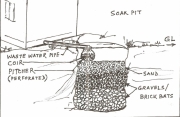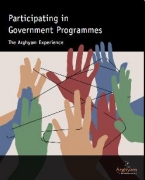/regions/india
India
School water, sanitation and hygiene education - Paper by Water for People
Posted on 24 May, 2010 04:52 PM This document by Water for People, emphasises the importance of appropriate sanitation coverage in schools that is gender sensitive and culturally acceptable to the needs of both boys and girl students, rather than the exclusive focus on adequacy of facilities.
This document by Water for People, emphasises the importance of appropriate sanitation coverage in schools that is gender sensitive and culturally acceptable to the needs of both boys and girl students, rather than the exclusive focus on adequacy of facilities.
It discusses the case of schools in rural areas in West Bengal where it was found that although the coverage of sanitation facilities was reasonable, lack of adequate availability of water, lack of consideration to student differences in terms of age and gender in the construction of latrines and drinking water facilities, poor systems of maintainence and disposal of wastes made the sanitation facilities inappropriate for use.
Rank of Indian cities on sanitation (2009-10) - National Rating and Award Scheme for Sanitation in Indian Cities (MoUD)
Posted on 24 May, 2010 02:18 PMIn order to get a sense of the current status of sanitation in India's cities, a survey was initiated by the Ministry of Urban Development as a part of the National Rating and Award Scheme for Sanitation for Indian Cities. The methods used for the survey can be found on the Ministry of Urban Development website.
The findings and the rankings of the cities according to the survey found that the situation was grim with only 25 cities topping the list, while majority of the others lagged behind in terms of a number of sanitation parameters.
Participating in Government Programmes - The Arghyam Experience (2010)
Posted on 21 May, 2010 01:25 PM Arghyam, a civil society organisation working on water issues since 2005, has participated in drinking water programmes involving State Governments since its inception, either directly or by partnering with local Civil Society Organisations (CSOs).
Arghyam, a civil society organisation working on water issues since 2005, has participated in drinking water programmes involving State Governments since its inception, either directly or by partnering with local Civil Society Organisations (CSOs).
This publication documents Arghyam's and its partners' collective experiences in participating in these Government programmes and puts forward key learnings and challenges.
The various programmes include - Sachethana, a school rooftop rainwater harvesting programme, and Suvarnajala, a flouride mitigation programme, both in Karnataka; Pani Thiye Panjo, a decentralised drinking water management programme in Gujarat; and Mazhapolima, an open-well recharge programme in Kerala.
Jobs via Devnetjobs - dated 19 May, 2010
Posted on 18 May, 2010 02:47 PMContent Courtesy:DevNetJobsIndia
- Programme Manager - Drinking Water
Lanco Foundation
Location: Gurgaon - Haryana
Last Date: May 24, 2010
Increasing transparency and accountability – Another win!
Posted on 14 May, 2010 11:31 AMGuest Post: Amrtha Kasturi Rangan, Arghyam
“When a State Government instead of itself undertaking a work, if it allows an agency like the petitioner Company by substantially funding them to undertake such work which is essentially that of a municipality, no one can say that such work of the petitioner company as a private activity. On the other hand, it is very much a public activity over which public interest can generate”.
Judgement in WP NO. 9794 of 2008 and M.P. Nos. 1 and 2 of 2008
The Right to Information (RTI) Act, 2005 was enacted to ensure transparency and accountability. As per the Act any citizen can write and ask for information from a “public authority”. The Act also requires that public authorities make information about themselves available to the public – mandatory disclosure.
From its time of enactment, there have been several challenges in operationalizing the RTI Act. A progressive civil society has constantly challenged hesitation and delay in providing information. Several ambiguities have required judicial intervention to interpret the letter and the spirit of the Act. Here we look at the success of widening the scope of accountability to include private agencies who partner with the government under the Public Private Partnership (PPP) model.
Sankalp awards 2010 winners : SarvaJal & Shramik 3S recognised for their double bottomline(social and financial) returns
Posted on 11 May, 2010 04:28 PM
The Sankalp 2010 Awards and Investment Forum is an annual Intellecap initiative committed to catalyzing entrepreneurship in the social enterprise space. Sankalp actively facilitates collaboration between established and budding entrepreneurs, investors, thought leaders and sector stakeholders interested in contributing effectively towards this fledgling yet fast-growing industry.
With a strong focus on double bottomline (social and commercial) enterprises Sankalp, in its second edition, aims to accelerate investment in this space through the showcase of pioneering, sustainable and innovative enterprises capable of long term social impact. Sankalp's primary goal is of bringing together various stakeholders sharing a common conviction that capital should be invested to create multiple bottom-line returns (financial, social and environmental) and not exclusively financial (profit-maximizing) or social (philanthropic) returns.
Thus having successfully established a niche for itself; Sankalp has taken the lead in recognizing those businesses that have mastered the balancing act between the profit and social objectives. Sankalp 2010 Forum and Awards shall recognize, award and connect the most investible social MSMEs (Micro, Small and Medium enterprises) operating in 5 high impact sectors:
On variability of hydrological wet season, seasonal rainfall and rainwater potential of river basins in India (using rainfall data over 1813-2006) - An IITM technical paper
Posted on 10 May, 2010 09:12 PMThe paper discuses climatological and fluctuation features of important parameters of the Hydrological Wet Season (HWS), viz. starting and ending dates, duration, seasonal rainfall/rainwater and surplus rainfall/rainwater potential individually for the eleven major and thirty six minor river basins, the West Coast Drainage System (WCDS) and the rest of the country. It is based on reliable monthly rainfall data from a well spread network of three hundred and sixteen rain gauge stations from 1813 upto 2006.
The paper observes that the average period of the HWS is in close conformity with the southwest Monsoonal Rainy Season (MRS) over the basins in the Core Monsoon Rainfall Regime (CMRR). In the Mixed Monsoon Rainfall Regime (MMRR) covering south peninsula, northeast and extreme north, the HWS is of longer duration compared to the MRS due to extra-monsoonal rainfall over there. The mean starting date of the HWS is May 30, ending October 11 and the duration is 135 days for the entire country.
Water jobs viz DevNetJobs dated May 5, 2010
Posted on 05 May, 2010 11:35 AMContent Courtesy:DevNetJobsIndia
- Dialogue Coordinator
The Trans-boundary Water Dialogue (TWD) Project
Location: New Delhi
Last Date: May 12, 2010
Community-led Total Sanitation newsletter for May 2010
Posted on 05 May, 2010 11:07 AM
Community Led Total Sanitation (CLTS) is an innovative methodology for mobilising communities to completely eliminate open defecation (OD).
Urban Population and WatSan: A brief status report by WaterAid (2009)
Posted on 03 May, 2010 04:44 PMThis document by WaterAid India, India highlights the poor water and sanitation situation in the urban slums in India, in the context of rapid urbanisation and the increase in the number of slums and slum dwellers in the cities.